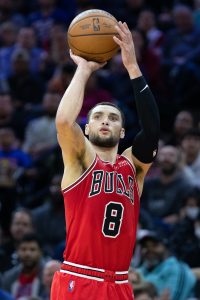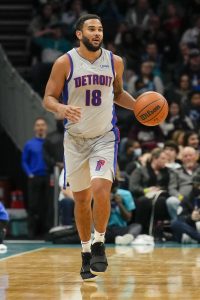For the rest of the regular season and postseason, Hoops Rumors is taking a closer look at players who will be free agents or could become free agents this offseason. We consider whether their stock is rising or falling due to their performance and other factors. Today, we’re focusing on a handful of Central players.
Zach LaVine, G, Bulls
 2021/22: $19.5MM
2021/22: $19.5MM
2022/23: UFA
Stock: Up ⬆️
LaVine is dealing with a knee injury that has diminished his explosiveness, but it hasn’t slowed him down too significantly — he hasn’t scored fewer than 20 points in a game since the All-Star break, and he’s coming off a 33-point showing in Utah on Wednesday.
While the injury is a short-term concern that may need to be addressed surgically in the summer, there’s no reason to believe at this point that it will be a nagging issue in future seasons. LaVine is still significantly outperforming his current contract and is in line for a maximum-salary deal this summer, likely with the Bulls.
Collin Sexton, G, Cavaliers
2021/22: $6.35MM
2022/23: RFA
Stock: Down ⬇️
Sexton is also dealing with a knee injury, but it’s more serious than LaVine’s. The Cavaliers guard appeared in only 11 games before meniscus surgery sidelined him for the remainder of the season.
The fact that Sexton averaged 24.3 PPG with an efficient .475/.371/.815 shooting line in 2020/21 shouldn’t be overlooked, but there are a number of factors working against him. With Darius Garland and Caris LeVert under contract for next season and Sexton entering restricted free agency in an offseason when few teams will have cap room, the Cavs will have plenty of leverage in negotiations. Concerns about Sexton’s knee and his defense may further limit his ability to secure a significant raise.
An eight-figure annual salary is still certainly within reach for Sexton, but a payday in the $80-100MM range no longer looks like a good bet.
Bobby Portis, F/C, Bucks
2021/22: $4.35MM
2022/23: $4.56MM player option
Stock: Up ⬆️
Portis raised some eyebrows when he settled for a two-year, $9MM deal with the Bucks in 2021, giving the club a “hometown” discount after winning a title in Milwaukee. That agreement included a second-year player option, so Portis has the opportunity to revisit the open market in 2022. At this point, it’s hard to imagine he won’t take advantage of that opportunity.
With Brook Lopez out for much of the season, Portis has been thrust into a larger frontcourt role and has responded with a career year, averaging 15.3 PPG and 9.1 RPG on .484/.405/.752 shooting in 61 games (28.9 MPG). He’ll have Early Bird rights this time around, putting him in a better spot to get a raise from the Bucks, who shouldn’t expect the 27-year-old to once again accept a team-friendly rate.
Cory Joseph, G, Pistons
 2021/22: $4.91MM
2021/22: $4.91MM
2022/23: $5.16MM player option
Stock: Up ⬆️
The Pistons have been one of the NBA’s worst teams since the start of the season, and any national attention they’ve gotten has focused primarily on Cade Cunningham, Saddiq Bey, and the rest of their young core. Their 30-year-old journeyman point guard shouldn’t be overlooked though — Joseph is enjoying one of the best seasons of his career in Detroit this season, averaging 8.1 PPG and 3.8 APG with a career-best .423 3PT% in 59 games (24.8 MPG).
Joseph may be happy with the Pistons and not interested in seeking a change of scenery. But if he decides to opt out this summer, he should certainly be able to earn a raise, perhaps from a team much closer to title contention.
T.J. Warren, F, Pacers
2021/22: $12.69MM
2022/23: UFA
Stock: Down ⬇️
Having officially been ruled out for the rest of 2021/22, Warren will enter unrestricted free agency having played just four games in the last two seasons due to foot injuries. It’s been an unfortunate run for the veteran forward, who had a great 2019/20 season and looked like one of the NBA’s very best scorers in the Walt Disney World bubble that summer.
What Warren has gone through is reminiscent of what happened to another former Pacer, Victor Oladipo, following his breakout years in Indiana. Oladipo battled leg injuries for two seasons and ultimately settled for a minimum-salary contract when he became a free agent.
Unlike Oladipo last year, Warren should be healthy when he reaches the open market this summer. But given how little teams have seen from him over the last two years, he may not be able to do a whole lot better than the minimum deal Oladipo got.